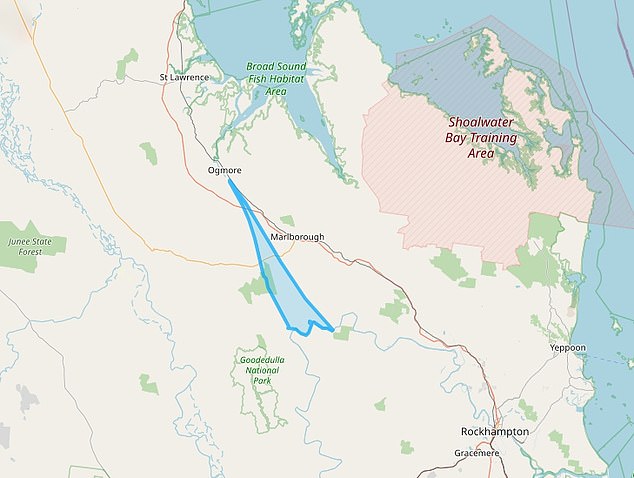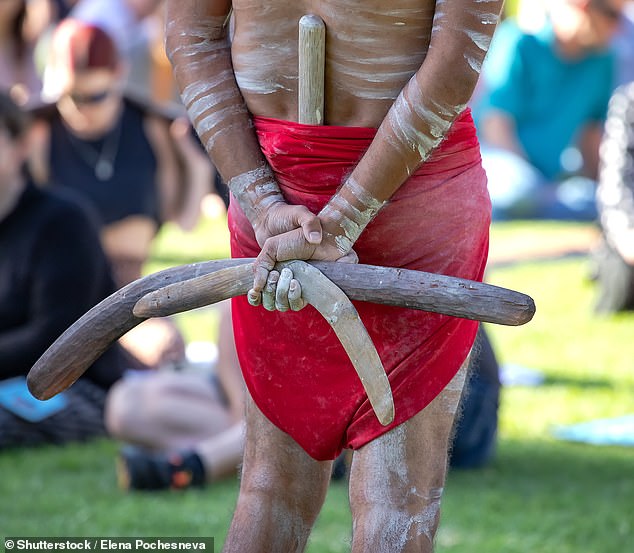Aboriginal group wins native title case giving them control over huge area of land in Central Queensland
A decade-long feud over two Indigenous ownership claims has come to an end, with 7,800 square kilometers of Australia returned to its First Nations traditional owners.
The Barada Kabalbara Yetimalara people were granted native titles for two areas in Central Queensland after the Federal Court of Australia ruled in recent days.
One parcel covers over 7,512 km2 between Sarina and Rockhampton, while the second covers 294 km2 of land and water north of Rockhampton.
The native title applications were first submitted in July 2013.
They are the first in several years to hit the Isaac region, west of Mackay.
According to the Australian National University, ‘native title claims are generally made by those described in the application as descendants of one or more of those listed as ancestors’.
“These ancestors are commonly known as ‘apical ancestors,’ which simply means they are at the top of the genealogical story.”
The persons named in this case were Barada Woman (husband of Johnny and Charlie Budby), Lucy and/or Jimmy Barber, Kitty aka Kitty Eaglehawk, Yatton Boney, Maggie (mother of Jack Mack and Gypsy Tyson) and King Boco, the Courier mail reports.
The Barada Kabalbara Yetimalara people were awarded native titles for two areas in Central Queensland after the Federal Court of Australia handed down its judgment

One piece of land covers more than 7,512 km2 between Sarina and Rockhampton, while the second (pictured) covers 294 km2 of land and water north of Rockhampton
Documents filed in the Federal Court stated that the ancestors had “associations within and close to the claim areas” around the “commencement date of sovereignty” in 1865.
One document from November 1887 contained a letter from a person named JB Shannon who sold rations to Lucy, Sugar, Kitty and Boco for two shillings before they ‘sent away the dark ones’.
Evidence presented at hearings in the country also provided insight into the Barada Kabalbara Yetimalara people’s history with the land.
That evidence included testimonies of traditional knowledge passed down from generation to generation, such as warnings not to eat emus because they were ancestors.
The Federal Court’s ruling will grant the Barada Kabalbara Yetimarala people ‘the right to possess, occupy, use and enjoy the lands and waters of the Area(s) of Application to the whole world, in accordance with traditional laws and customs of the claim group. ‘.
The National Native Title Tribunal states that native titles enable the Barada Kabalbara people to travel through the areas, camp and erect temporary shelters, hunt, fish, collect and take natural resources for personal, domestic and non-commercial common purposes.
The Barada Kabalabara Yetimarala people will also be able to hold meetings, hold ceremonies, maintain important sites, teach, live and be buried on or bury native title holders on the land.
They can also ‘speak authoritatively about the areas among other Aboriginal people in accordance with traditional law and customs’, ‘make decisions regarding the use and enjoyment of the area or areas by Aboriginal people who recognize that they are governed by traditional law and customs recognized and adhered to by the native title holders’, and ‘convey the cultural heritage of the native title claim group, including knowledge of particular locations’.
However, the traditional laws and customs administered under native titles remain ‘subject to and exercisable in accordance with’ the laws of the state and federal government.
Sam Dallachy and Ors filed native title proceedings in the Federal Court on behalf of the Barada Kabalbara Yetimara People in January 2019.
The case was heard at least 50 times and more than 120 documents reviewed, all involving Judge Sarah Derrington, Judge Darryl Rangiah and Judge John Reeves, before a verdict was handed down in May.
Applicants across the case included Lalu Asela, Elizabeth Doyle, Juanita Mason, Skye Muller, Norman Ross, Deborah Santo, Vanessa Saunders, Michael Smith, Davina Tilberoo Snr, Claudine Walsh, Anthony Henry and Margaret Hornagold.
More than 30 respondents were named in cases including the Central Highlands, Isaac Regional, Livingstone Shire, Rockhampton Regional and Woorabinda Aboriginal Shire councils.
Several local resources and mining companies were also involved, including Anglo Coal, Caml Resources, Foxleigh Coal, Nippon Steel Australia, Sumitomo Metal Australia, Orion Gold, Pan Investments and Peabody, with Telstra, Amplitel, Ergon and the Queensland Government.

Queensland has received at least 400 native title applications since 1994, with the latest lodged in January by the Djabugay Nation People
Queensland has received at least 400 native title applications since 1994.
About 180 of these were given initial coverage land in the Hope Vale Aboriginal Shire, north of Cooktown.
There are currently 39 active native title claims across Queensland. The latest was submitted in January by the Djabugay Nation People for land south of Port Douglas to Cairns and west to Mareeba.
